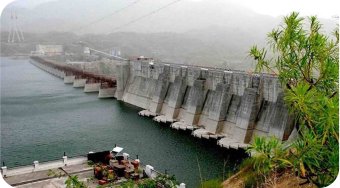
The Kalpsar Project is an ambitious proposed tidal power and freshwater reservoir project planned in the Indian state of Gujarat. Here are the key aspects of the project: Location: The proposed site for the Kalpsar Project is in the Gulf of Khambhat (Cambay), off the coast of Gujarat, India. Purpose: The primary objectives of the Kalpsar Project include: Creation of a freshwater reservoir: The project aims to impound the floodwaters of rivers flowing into the Gulf of Khambhat to create a large freshwater reservoir. Tidal power generation: The project intends to harness tidal energy to generate electricity through a tidal power plant. Salinity control: The freshwater reservoir would help control the ingress of seawater into coastal areas, thereby reducing soil salinity and benefiting agriculture. Transportation: The project envisions constructing a dam or barrage across the Gulf of Khambhat to create a tidal reservoir, which could potentially serve as a sea link between Bhavnagar and Surat. Components: The Kalpsar Project includes several key components, such as: Construction of a dam or barrage: This structure would be built across the Gulf of Khambhat to impound tidal waters and create a reservoir. Tidal power plant: The project proposes the installation of turbines to generate electricity from tidal energy. Navigation channels: To facilitate navigation and transportation, the project plans to include channels or locks in the dam structure. Challenges and Feasibility: The Kalpsar Project faces various challenges, including environmental concerns, engineering complexities, and financial viability. Critics have raised questions about the environmental impact on marine ecosystems, the feasibility of maintaining the freshwater reservoir, and the cost-effectiveness of tidal power generation. Status: As of my last update in January 2022, the Kalpsar Project remains in the planning and feasibility study stage. While it has been under consideration for several decades, significant progress towards its implementation has yet to be made. The project requires substantial investment, technical expertise, and consensus among various stakeholders before it can proceed to construction. Overall, the Kalpsar Project represents a bold vision for addressing water management, energy generation, and transportation needs in Gujarat, but its realization hinges on overcoming numerous challenges and securing adequate resources and support.





